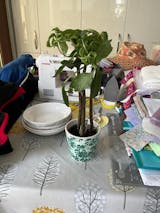Always popular, this houseplant gets its common name from its bright, red-and-yellow flowers which do bring to ming the colourful tropical birds. Think of its tropical environment when putting this plant in your house; it loves warmth, but doesn't want to be near a heater that will dry it out. The right conditions will also help it flower year on year, so if you love those colours, be sure to keep it well nourished and watered! Choose this plant for its gorgeous flowers and stylish, upright growth and it will repay your care with its vibrancy.
Scientific Name
Impatiens niamniamensis (impatient plant, species from Niam-Niam, Central African Republic)
Common Name
Parrot Impatiens, Parrot Plant, Congo Cockatoo
Origin
Native to tropical Africa, from Cameroon to Sudan to the Democratic Republic of the Congo
Light
Bright, indirect light is best; while they like bright light, they can dehydrate and burn in too much direct sun.
Water
Water when the top inch or so of soil has dried out.
Humidity
This tropical plant loves high humidity, but average household humidity should also be fine. Make sure it is not in a draught or too near an operating heater.
Soil
Grow in moist, well-draining soil; one with added coir and perlite, such as soil designed for Calatheas and Marantas, will work well here. Repot every year or so, as the plant grows.
Food
Feed every four waters in the growing season, reduce to every six in autumn and winter. If your plant is struggling to flower, a fertiliser high in potassium will help.
Temperature
Ideal temperature is between 15-25°C; make sure it does not get colder than 10°C in winter.
Pet-safe
Yes, but too much nibbling won't be good for pets, small humans or the plant!
Sprouts Top Tips
To help it get through winter and better flower the following year, reduce watering, fertilising and allow it to be slightly cooler (though still not much lower than 15°C where possible!). This will help it have a dormancy period and recover for the next growing and flowering period.



















![The 'Mulled Wine' Fresh Foliage Christmas Wreath [Made to Order]](https://judgeme.imgix.net/sprouts-of-bristol/1764939241__img_20251128_124445__original.jpg?auto=format&w=500)












